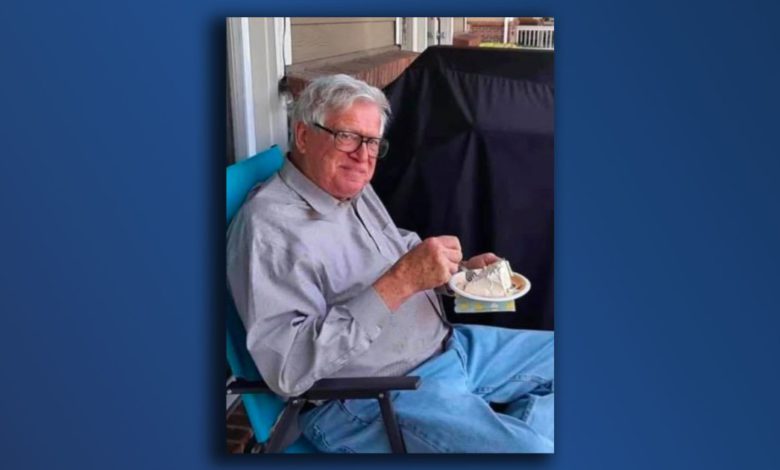
IDAHO SPRINGS, Colo. (KMGH) — The 75-year-old man who was allegedly assaulted by an officer with the Idaho Springs Police Department (ISPD) filed a lawsuit against officers and the department Monday morning. He claimed that police tased him, dragged his unconscious body out of his apartment, and took a sword from a high shelf in his unit, and dropped it in the hallway.
In the lawsuit, obtained by KMGH, Michael Clark claimed violations of his civil rights under federal and Colorado constitutions by two officers — Nicholas Hanning and Ellie Summers — and their supervising officer, Cpl. Richard Sonnenberg. Clark also sued the police department, claiming they failed to train and supervise the officers, and that they have unconstitutional practices and policies.
Sarah Schielke, Clark's attorney, said body camera footage captured the officers committing assault, burglary and kidnapping when they responded to Clark's Idaho Springs apartment in May 2021 after receiving a complaint that a man had punched a woman in the face.
On July 22, Clark's attorney released a full video of the body camera footage from that night, which is below.
According to an affidavit, Idaho Springs police did not announce themselves when they knocked on Clark's door, did not warn him before using a Taser, and when they accused Clark of punching his neighbor, he claimed it was "absolutely false."
The affidavit was released a day after the attorney and Clark's family claimed in a press release that Hanning "tased, kicked, tackled, punched and choked" the unarmed and unclothed man in his apartment.
Hanning was charged with assault of an at-risk adult. He was later fired, the police department announced on July 16. Summers was not charged.
Lawsuit claims police set up scene to look like Clark came out of his apartment armed
The incident started with a 911 call on the evening of May 30, 2021.
Clark's neighbors, Timothy Braden and Brittany Odom, had just moved in. That day, they were drinking, smoking marijuana and sorting through moving boxes, according to the lawsuit.
By 10 p.m., Odom was drunk, stumbling and yelling in the apartment. Braden decided to take his dog for a walk and left.
Odom then somehow banged into the wall she shared with Clark, who hit his fist on the wall in response and yelled for her to keep it down, according to the lawsuit. She screamed at him and then called Braden, who initially ignored her calls.
When he returned home, Odom claimed Clark had banged on the wall, told her to shut up, and then punched her in the face, according to the lawsuit.
Braden suggested they call the police and after Odom put up "a small fight," she agreed he should call to report an assault, according to the lawsuit., according to the lawsuit.
While on the phone with police, Braden gave the phone to Odom, who told police Clark "had punched her in the mouth and face, that there was blood everywhere, and that all she had done to deserve this was politely knock on his door to inquire as to his specific concerns regarding her noise," according to the lawsuit.
Two officers, Hanning and Summers, responded to the call.
Idaho Springs Police Department
They first went to Odom and Braden's apartment. Braden told police who he was and again said he had not seen what had happened.
Odom claimed Clark had banged on the wall or door while she had been sleeping and she had gone outside. She claimed that's when Clark punched her. When asked where Clark lives, Odom responded, "I don't know. Right there, possibly?" according to the lawsuit.
Odom did not have any visible injuries, or markings consistent with a punch to the face, according to the lawsuit. Her face was not bruised or swollen. Her clothes were not bloodied.
"Ms. Odom’s repeated demonstrations of the way she had allegedly been hit indicated a strike of considerable force to her face and mouth. Yet there was no physical evidence to be seen which corroborated this fantastical story," the lawsuit reads.
The lawsuit claims that if police had looked her up, they would have found she was convicted of first-degree fraud for giving Florida police a false identity in December 2016, and was charged with felony domestic violence in August 2011 and again in October 2012 in South Carolina. She was convicted of driving under the influence involving property damage in July 2016.
Police asked a few other questions — mostly about Clark's appearance — before moving down the hall to the door of his apartment. Police spoke to Odom and Braden for about 95 seconds and did not ask for Odom's name, according to the lawsuit.
Clark lived alone in Idaho Springs, having decided to make the move from Arvada in June 2020 to fulfill his dream of living in the mountains. He toured the apartments at Big Horn in Idaho Springs, moved in, and "quickly became a beloved character in the neighborhood," the lawsuit says. He was a hard worker and in the days leading up to the incident, had been cleaning and repairing the masonic lodge in town to prepare it for future meetings. He is a 32° Scottish Rite Freemason and is well-known as a patriot, the lawsuit reads.
On May 30, 2021, he volunteered during the day at the Fort Lupton National Cemetery putting American flags on the graves of veterans. He came home tired and in anticipation of a big celebration the following day for Memorial Day, he went to bed around 8:30 p.m.
According to the lawsuit, he woke up a few hours later to a loud bang on the wall he shared with a neighbor. It was enough to move some of his furniture. He banged on the wall three times and yelled for them to keep it down. A woman in the other apartment yelled something back, which Clark said he couldn't make out, so he fell back asleep.
He then woke up to somebody knocking on his door. The police did not identify themselves and Clark assumed it was his neighbors, looking for a confrontation, the lawsuit reads.
He went to the door in his boxers and grabbed a collectible sawfish snout sword — which was a gift from his late brother-in-law he displayed on his bookshelf — in case he needed to defend himself.

Sarah Schielke with The Life & Liberty Law Office
Later, Summers would ask Hanning why they didn't announce who they were, to which Hanning replied there were "two schools of thought" about whether they should do so or not. Summers accepted the explanation, according to the lawsuit.
"There is only one 'school of thought' for how that should safely be done, particularly in the middle of the night: By knocking and announcing yourselves as police officers," the lawsuit reads. "Otherwise, most people are going to be frightened and likely arm themselves on the way to answer their doors."
When Clark unlocked the door, he asked, "What do you want?"
Hanning said "What the f***?" when he spotted the sword and walked inside. At the same time, Summers pointed her gun at Clark. She later told the Colorado Bureau of Investigation that she hadn't seen the sword until Clark had reached up to put it on a shelf.
"If her statement is true, then by her account, she pointed a gun at Mr. Clark in his home not because he had a sword but simply because he had opened his door," the lawsuit reads.
When Hanning entered Clark's apartment, he kicked the man in the leg and punched his head, according to the lawsuit. He yelled at Clark to put the weapon down, and Clark put it on the shelf and faced the officers.
The lawsuit notes that during this time, when the officers had moved back into the hallway and Clark was standing unarmed and unclothed inside his apartment, that the police had multiple ways of escape if they felt threatened.
"They did not know how to de-escalate or retreat from this situation they had created," it reads.
Summers and Hanning then demanded contradictory actions of Clark — Hanning ordered him out into the hallway and Summers ordered him on the ground. Summers still had her gun pointed at Clark. He did not move, according to the lawsuit.

Sarah Schielke with The Life & Liberty Law Office
"Officers Hanning and Summers, on the other hand, did not remain calm," the lawsuit claims. "Instead, Officers Hanning and Summers became a wild, frenetic, echo chamber of escalation."
In the lawsuit, Clark said he thought police were there to resolve the wall-banging dispute, and assumed the neighbor had called police and now it was his turn to tell police his side of the story. He started to explain and when Summers interrupted him, demanding he get on the ground, he calmly said, "No," according to the lawsuit.
According to ISPD practice, if an order is issued and the person refuses to comply, physical force is the next step.
"Hanning knew how they did things at ISPD," the lawsuit reads. "If a subject did not comply with an officer’s commands, they were going down. Within a second of Mr. Clark saying 'no,' you can hear, on the videos, the (loosening) of the Velcro on the holster for Hanning’s Taser as he pulls it out. Hanning pulled it out, and quite deliberately, taking time to aim, pointed its red laser on Mr. Clark’s stomach."
Summers did not react to the red laser.
Clark was unaware of the laser and continued explaining that his neighbors had hit the wall.
Without warning, Hanning fired his Taser and Clark fell backward, hitting his head on a chair, the lawsuit reads.
As he tried to move Clark's limp body, Hanning slammed the elderly man's head against the corner of a bookshelf. Hanning and Summers continued to move his body into the hallway, the lawsuit reads.
"Removing Mr. Clark from deep inside his apartment and depositing him out in the hallway was the first critical seed of Hanning and Summers’ big lie," the lawsuit reads. "For, it would be rather hard to explain their tasing of an elderly man if that man’s body was found inside the threshold of his own apartment.... No one could reasonably claim Mr. Clark 'came out' with a weapon unless his body was found actually 'out.'"
Clark was unconscious as they moved him, and was making gurgling sounds as he tried to breathe.
Summers then communicated with dispatch, saying: "207, Taser deployed, party came out with a machete," the lawsuit reads.
In the hallway, Hanning put Clark on his stomach — with the taser probes still in his front — and put his knee on Clark's neck. This caused an injury to Clark's carotid artery that later required carotid artery surgery, the lawsuit reads.
More than a minute after the tasing, Hanning called for an ambulance.
He then went back inside the apartment, grabbed the sword from the shelf and dropped it about five yards down the hallway, according to the lawsuit.
When Clark came to, he was in his underwear on the floor of the hallway outside his apartment in handcuffs. He tried to again explain the banging on the walls.
In the background, Odom can be heard screaming, the lawsuit reads. Summers decided to go talk to her. She found Odom on the floor of her apartment sobbing and holding Braden's hands. Summers told Odom she was there for her and that she was safe, according to the lawsuit.
Around this same time, Hanning asked Clark's first name. He also read his Miranda Rights and told him he was under arrest. Hanning asked if Clark had been drinking and he said no and that he'd take a test to prove it.
Later, at the hospital, Clark was tested for drugs and alcohol, which came back negative.
When EMTs arrived at the apartment, Hanning told them Clark had "gotten a kick to the knee" and "a cut to his head," the lawsuit reads. Summers added that he lost consciousness for less than a minute after being tased. He was unconscious for two minutes and 23 seconds.
As EMTs worked to remove the taser probes from his stomach, Clark asked Summers what was going on, the lawsuit reads. She ignored him.
Meanwhile, a few EMTs tried to talk to Odom about her injuries. She asked them why they were questioning her.
“Well, the last time I checked, I was the one that was assaulted, and I don’t need these questions,” she told them, according to the lawsuit.
Braden asked that she apologize to the EMTs, which she did.
Down the hallway, Clark asked again what he had done. Hanning ignored him before responding, "You punched that girl." Clark responded, "Huh?" and said that was a false claim, the lawsuit reads.
"I was just in bed," he told Hanning. "I attacked nobody. I was just laying in bed. I did nothing.”
Hanning picked up the sword and showed it to Clark, asking if it looked familiar. Clark looked confused and said that had been "up top there," gesturing back at his apartment, the lawsuit reads. Hanning waved it off.
In a conversation captured on the body camera footage, an EMT said the sword had been laying on the ground when he or she arrived at the scene. Clark repeated that he did not take the sword back down after police entered his apartment.
"Did you go into my apartment and look for weapons?" Clark asked, according to the lawsuit.
"They don’t need to look in your apartment. It was here in the hallway," the EMT responded.
"How did it get in the hallway? How did it get in the hallway? I didn’t bring it out. I didn’t bring it out," Clark said.
At one point, Summers told an EMT that she didn't think Clark realized he was almost shot that evening.
The EMTs wheeled Clark into an ambulance. Hanning never mentioned he had done a chokehold knee restraint on the man, according to the lawsuit.
Hanning stayed behind with Odom, and Summers went to the hospital with Clark. Beforehand, Summers and Hanning agreed Clark would be charged with misdemeanor assault and two counts of felony menacing.
"Their conversations about how this charging decision was appropriate reveal that both officers were not properly trained regarding what constitutes such crimes in Colorado, or what basic rights Colorado citizens have," the lawsuit reads. "The officers’ reasoning about how they could charge Mr. Clark with felony menacing (naming themselves as the victims) was particularly shocking given that they themselves had just committed second-degree assault on Mr. Clark. They had also tampered with evidence, committed felony burglary, and then had literally kidnapped Mr. Clark, among other crimes."
When a victim's advocate with the Idaho Springs Police Department arrived at the apartments the evening of the incident, Hanning escorted her to Odom's unit. Odom described the alleged assault with "many new details," according to the lawsuit. She told the victim's advocate that Clark had pulled a gun to her understanding, and Hanning corrected her, saying it was a machete. Despite only moving in the day prior, she claimed Clark "creeps" on her 24/7 and was a pedophile, according to the lawsuit. In her conversation with the advocate, Odom repeatedly threatened to kill Clark.
Hanning asked her if she knocked on Clark's door or vice versa, and Odom started to describe a story with new details, claiming Braden was knocking on doors and holding her back from fighting Clark, according to the lawsuit.
The following day, May 31, 2021, Hanning called Braden to see if he could re-interview Odom if she was sober enough. Braden said yes, but when Hanning arrived at the apartment, Odom was "still utterly intoxicated," according to the lawsuit. She told new iterations of the story that did not line up with prior ones.
The lawsuit claims that the Fifth Judicial District Attorney’s Office and the Idaho Springs Police Department had access to this video but never informed Clark of the threats. If Clark had been released from the hospital, he would have returned to his apartment unaware his neighbor had repeatedly threatened to kill him, according to the lawsuit.
Clark moves in and out of hospital
At the hospital on May 30, Clark's initial vitals showed potential heart complications. He also needed stitches for the wound on his head.
Summers informed him of the charges that would be filed against him and Clark said if she found camera footage of the apartment hallway, she'd see he never came out of his apartment, according to the lawsuit.
During their conversation, Summers asked where Clark's wife was and he said she had died suddenly. He added that he hated nursing homes.
"If it comes that I’m in a nursing home, pull the plug. It’s not a life. If you can’t live life to the fullest," he said.
Hanning and Summers never attempted to locate or contact a next of kin for Clark.
Within 24 hours of the incident, Clark had a blood clot in his injured carotid artery and was vomiting blood. Twelve hours later, he had a stroke.
Summers told the hospital that Clark "had come after two police officers with a machete, which naturally made it into Mr. Clark’s medical records. With this allegation in his medical records, no skilled nursing facility would accept Mr. Clark," according to the lawsuit. He was released to his daughter, who struggled to provide her father with full-time care. She rushed him back to the hospital on June 9 when his blood pressure and heart rate became unstable, and he had carotid surgery, according to the lawsuit.
He was released on June 12 to his daughter along with pages of instructions on occupational and physical therapy, medications, and care he would need at home. About 48 hours after his release, he was back in the hospital for complications from the surgery. Doctors told Clark's children that they should prepare for him not to survive, according to the lawsuit.
He was again released to his daughter.
"Everyone labored to get the false allegations about him attacking police officers cleared from his medical records for purposes of obtaining admission for him into a skilled nursing facility," the lawsuit reads.
On June 21, he returned to the hospital with heart complications and dropping blood pressure.
On June 23, his children were able to get him accepted for release to a skilled nursing facility. Ten days later, his appendix burst and he returned to the hospital. By mid-July, he was back at the nursing facility, according to the lawsuit.
"However, he still requires both heart surgery and surgery to remove his burst appendix," the lawsuit reads. "Doctors do not think Mr. Clark’s heart is strong enough to survive the surgery to remove his burst appendix; but they also do not want to operate on his heart due to concerns of infection presented by the appendix rupture."
Clark had not broken any laws, according to the lawsuit, and has not been charged in connection to this incident.
Background on involved officers, supervisor
Hanning had been hired in October 2017 and has a history of excessive force incidents during his time in Idaho Springs and while employed at the Park County Sheriff's Office. In 2013, he was accused of breaking the rib of a 70-year-old where he had entered the man's home without permission, not announced himself, and used force without any investigation into the validity of the initial complaint, according to the lawsuit.
This was known to the Idaho Springs Police Department when he was hired.
"Upon information and belief, Hanning had to leave Park County Sheriff’s due to the number of complaints made relating to his fitness for duty, reckless uses of force, misrepresentations in written reports, and inability to de-escalate garden variety encounters with citizens," according to the lawsuit.
Summers has been an officer for two years with the police department and has numerous complaints against her, made by both citizens and supervisors. Almost every one relates to her "propensity to needlessly escalate, and her categorical inability to ever de-escalate, garden variety police encounters," according to the lawsuit.
About a dozen days before her encounter with Clark, she had responded to a call about barking dogs and when she arrived at the scene and invited the owner to let the dogs out — which the owner said were friendly — Summers pointed her gun at the animals as they ran around their yard. At one point, she aimed her gun at the dog in the owner's arms, according to the lawsuit.
"Later in the incident, Summers remarked to (the dog owner) that she should be grateful, since she (Summers) had 'almost shot your dog,'" the lawsuit reads.
In a separate incident in November 2020, she allegedly assaulted a man in handcuffs, leading the corporal on scene to yell at her to stop being so violent with the person in custody, according to the lawsuit.
Hanning and Summer's supervisor at the time of the incident with Clark was Cpl. Richard Sonnenberg. He is responsible for training them.
He watched both officers' body camera videos afterward, according to the lawsuit. The two officers were not pulled off-duty.
Sonnenberg approved of their decision regarding charges against Clark.
Like Hanning, Sonnenberg also came to Idaho Springs after losing his job at the Park County Sheriff's Office. In 2012, he pleaded guilty to official misconduct after shooting a beer keg to break up a lake party, according to the lawsuit.
"Both Hanning and Sonnenberg were apparently too reckless to be employed as police officers in Park County. Yet they fit right in at Idaho Springs. In fact, at Idaho Springs, they were both regularly promoted due to the department’s high turnover and nonexistent leadership or supervision," the lawsuit reads.
The lawsuit claims that "upon information and belief, Idaho Springs Police officers have received no actual training regarding how to safely interact with elderly citizens" and the incident with Clark never would have happened if the agency "valued following such training and policies." It also claims that police receive little to no training on how to de-escalate encounters.
The lawsuit criticized ISPD's Response to Resistance and Use of Force policy, which "repetitively states that the amount of force used on citizens should be reasonable and that less force is preferable to more force, while also repeating over and over again that those guidelines may be abandoned if the officer thinks it necessary to do so."
Looking ahead
The lawsuit says that Clark was a happy an independent man before the assault and is now suffering from "physical injury, pain, suffering, humiliation, extraordinary trauma, emotional distress, loss of independence, loss of enjoyment of life, and other damages."
The claims for relief in the lawsuit are as follows:
- Unreasonable seizure, excessive force (against Hanning and Summers)
- Failure to train and supervise (against Sonnenberg)
- Unlawful seizure (against Hanning and Summers)
- Excessive force (against Hanning, Summers and Sonnenberg)
- Municipal liability for unconstitutional custom/practice, failure to train, failure to supervise (against City of Idaho Springs)
- Substantive due process violation (against Hanning and Summers)
Clark is seeking declaratory and injunctive relief and compensatory and consequential damages, plus a formal written apology from each defendant, policy changes at the police department, and mandatory training to prevent a similar incident.
Clark intends to make a statement on Monday if his health allows him to do so, his attorney said.
This story originally reported by Stephanie Butzer on TheDenverChannel.com.









